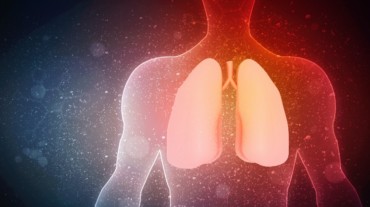
Indian Institute of Technology (IIT) Madras researchers have found that holding breath may increase risk of getting coronavirus disease (Covid-19), as the process of virus-laden droplets being transported into deep lung increases with decreasing breathing frequency.
The research team modelled the breathing frequency in a laboratory and found that low breathing frequency increases the time of residence of the virus and, therefore, it increases chances of deposition and consequently the infection.
Also, the multiscale lung structure has a significant effect on a person’s susceptibility to Covid-19.
The research was led by Prof. Mahesh Panchagnula, department of applied mechanics, IIT Madras, with his research scholars Arnab Kumar Mallik and Soumalya Mukherjee.
The findings of this study were published in the international journal ‘Physics of Fluids’.
“Covid-19 has opened a gap in our understanding of deep pulmonological systemic diseases. Our study unravels the mystery behind how particles are transported and deposited in the deep lung. The study demonstrates the physical process by which aerosol particles are transported into the deep generations of the lung,” said Panchagnula, while elaborating on the need for such research.

In their research, the team reported that holding the breath and having low breathing rate can increase chances of virus deposition in the lungs.
“The study was conducted to pave the way for developing better therapies and drugs for respiratory infections. Previous work from the group has also highlighted the significant variability in aerosol uptake from individual to individual, suggesting a reason why some people are more susceptible to airborne diseases than others,” the institute said in a statement.
Airborne infections such as Covid-19 spread immensely through sneezing and coughing as it instantly releases a large volume of tiny droplets.
The team imitated the droplet dynamics in the lung by studying the movement of droplets in the small capillaries which were of similar diameter to bronchioles. They took water mixed with fluorescent particles and generated aerosols from this liquid using a nebulizer. These fluorescent aerosols were used to track the movement and deposition of particles in the capillaries.
Select Topics of your interest and let us customize your feed.
PERSONALISE NOWThe researchers studied the movement of the fluorescent aerosol particles in capillaries of size ranging from 0.3 to 2 millimetres which covers the range of bronchiole diameters. They found that the deposition is inversely proportional to the aspect ratio of capillaries, which suggests that the droplets are likely to deposit in longer bronchioles.
The scientists also studied how the ‘Reynolds Number,’ a parameter that quantifies the nature of flow – steady or turbulent, determines the deposition in the capillaries. They found that when the flow of aerosol movement is steady then the particles deposit via the process of diffusion, however, if the flow is turbulent then the particles deposit via the process of impaction.
“In future, the team intends to continue this work to understand how the virus-laden droplets are transported into lungs as the process by which the virus is transported from the nasal cavity to the deep lung is still unknown. An understanding of the physics of this phenomenon could be crucial in mitigating the progression of the disease,” the statement further read.